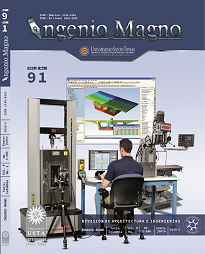Incidence of strategies metacognitive of the educational ones of mathematics in the understanding process, when solving problems of fraction like part all
Main Article Content
Abstract
Downloads
Article Details
DECLARATION OF ORGINIALITY OF SUBMITTED ARTICLE
With this document, I/We certify that the article submitted for possible publication in the institutional journal INGENIO MAGNO of the Research Center Alberto Magno CIIAM of the University Santo Tomás, Tunja campus, is entirely of my(our) own writing, and is a product of my(our) direct intellectual contribution to knowledge.
All data and references to completed publications are duly identified with their respective bibliographical entries and in the citations thus highlighted. If any adjustment or correction is needed, I(we) will contact the journal authorities in advance.
Due to that stated above, I(we) declare that the entirety of the submitted material is in accordance with applicable laws regarding intellectual and industrial property, and therefore, I(we) hold myself(ourselves) responsible for any complaint related to it.
If the submitted article is published, I(we) declare that I(we) fully relinquish publishing rights of the article to the University Santo Tomás, Tunja campus. As remuneration for this relinquishment of rights, I(we) declare my(our) agreement to receive two (2) copies of the edition of the journal in which my(our) article appears.
References
BENZÉCRY, (1982). Análisis de datos cualitativos. Programa de Computación.
Delgado, (1998). Las habilidades generales matemáticas. En Hernández (Ed.), Cuestiones de Didáctica de la Matemática. Rosario: Homo Sapiens.
Foures, C. (2011). Reflexión Docente y Metacognición, Revista Instituto de Estudios de Educación. Universidad del Norte, Comahue, Provincia de Río Negro, Argentina. No. 14, julio-diciembre, 2011.
Glaser, B., Strauss, A. (1967). The discovery of grounded theory: strategies for qualitative research. New York: Aldine Publishing Company.
Iriarte P. (2011) Estrategias Metacognitivas en la Resolución de Problemas Matemáticos, en Estudiantes de 5º. de Básica Primaria. Tesis. Universidad De Sucre. I.E. Normal Superior de Sincelejo. Colombia.
MEN. (2002, 2011). Estatuto de Profesionalización Docente. Bogotá, Colombia.
MEN. (2013). Evaluación de Competencias. Bogotá, Colombia
Miles & Huberman, (1994). Qualitative data analysis: An expanded sourcebook (2a ed.). Thousand Oaks, CA: Sage.
Morse, J.M. (1994) Designing funded qualitative research. In Denzin, N.K. and Lincoln, Y.S., Eds., Handbook of Qualitative Inquiry, Sage Publications Ltd.
Obando, G. (2003). La Enseñanza de los Números Racionales a Partir de la Relación.
Parte-Todo. Revista Ema, 8(2), 157-182.
Poblette & Dìaz, (2017). Competencias Profesionales del profesor de matemàticas. Universidad de los Lagos. Osorno, Chile. Revista Números. Vol. 53, marzo 2003. (pp.3-43) Chile
Rodríguez Q., E. (2005). Metacognición, Resolución de Problemas y Enseñanza de las Matemáticas. Una Propuesta Integradora desde el Enfoque Antropológico. Universidad Complutense De Madrid. Tesis Doctoral. Madrid.

